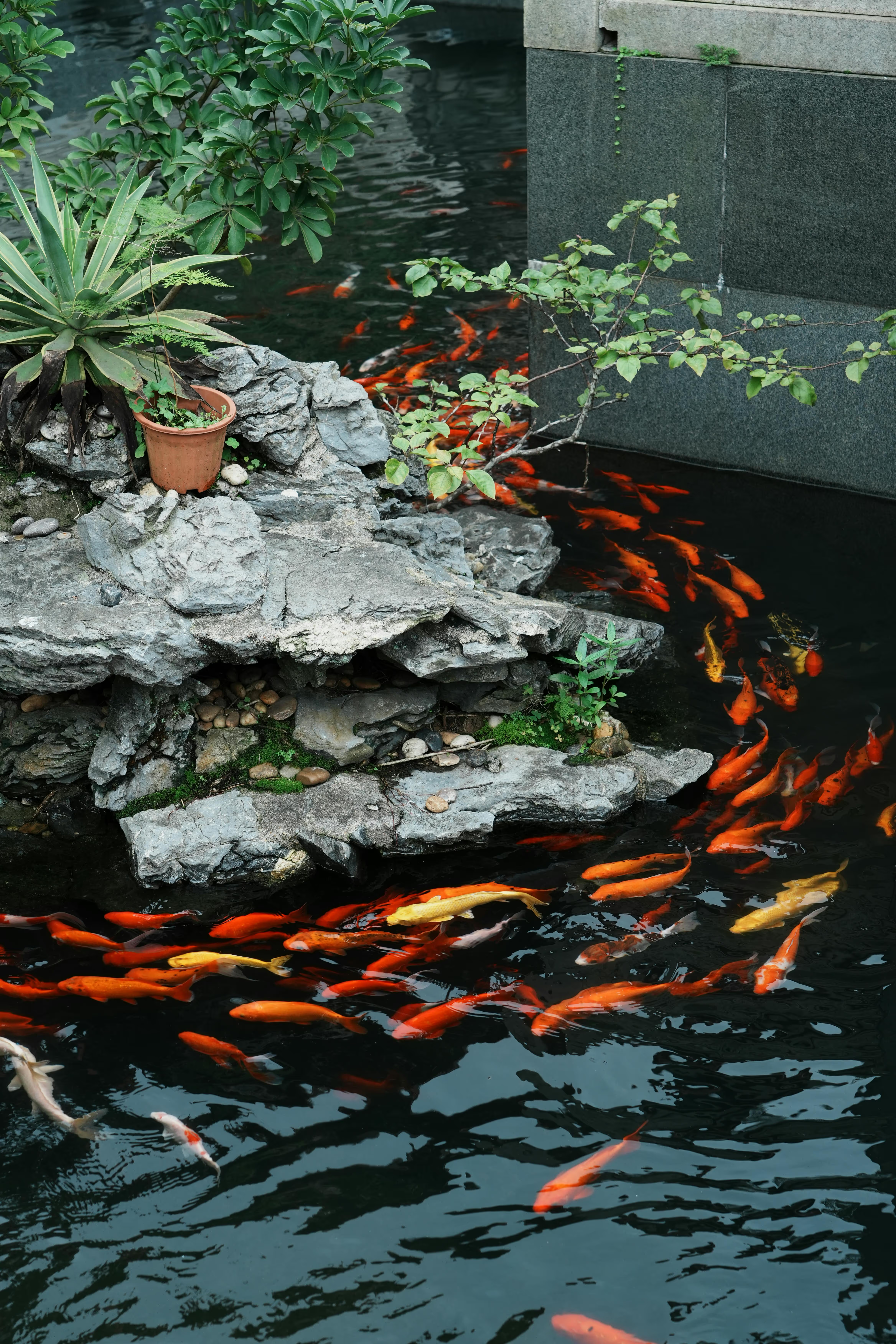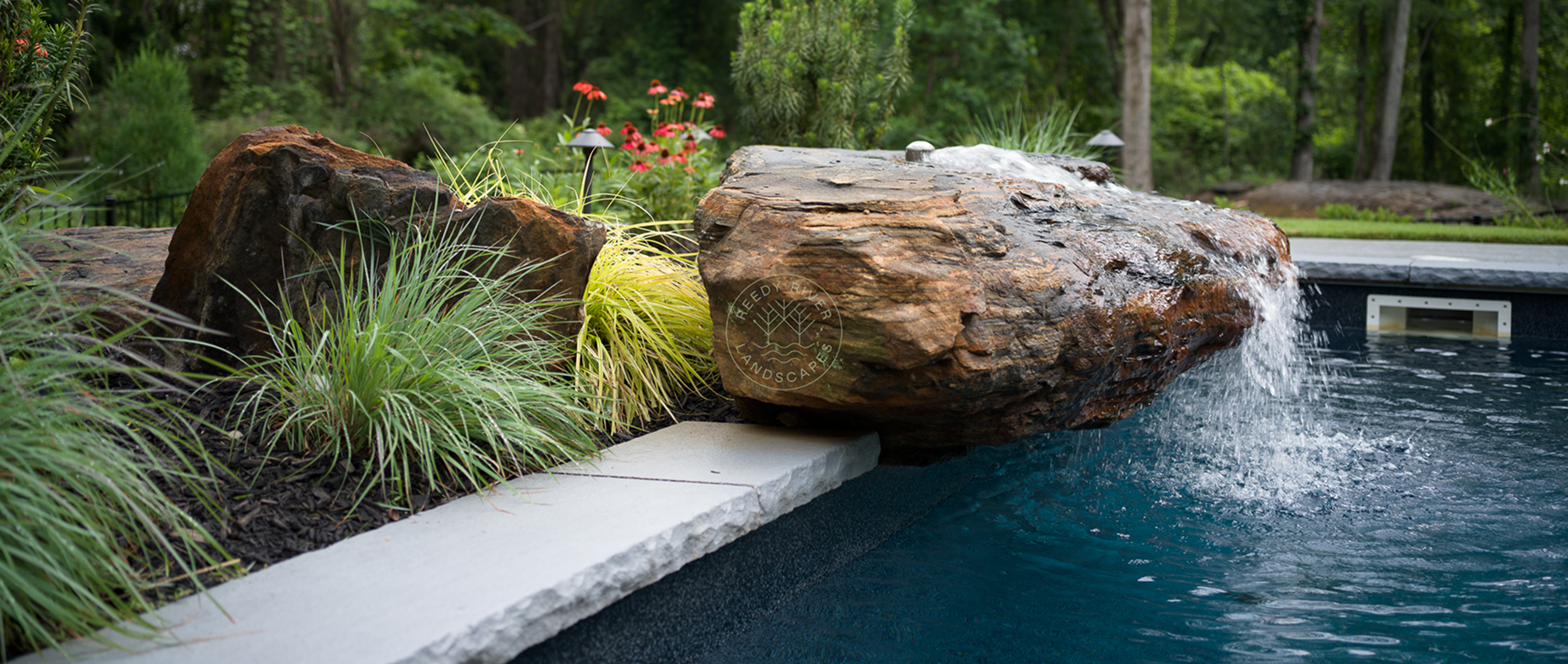Best Types of Fish for Your Recreational Pond in the Carolinas
Explore the best fish for your Carolina pond, from bass to koi, and create a balanced, thriving ecosystem in your backyard.

Creating a recreational pond can be a rewarding venture, especially when you choose the appropriate fish as this will not only enhance your backyard appeal but will transform a simple water feature into a thriving ecosystem.
Here’s your guide to discovering the best pond fish suitable for Carolina weather.
Largemouth Bass
The Largemouth Bass is undoubtedly a star for your pond due to its versatility for various conditions, making it a perfect fit for the warm, humid climate of the Carolinas.
They prefer ponds that are at least 1 acre in size and have a minimum depth of 8 feet. This pond fish not only is fun to catch but also controls populations of smaller fish and maintains a healthy balance in the pond.
When it comes to algae management, while they won't primarily eat algae, their presence can indirectly encourage other species that do and with larger bass around, you’ll often find a corresponding increase in smaller forage fish, which can keep unwanted algae in check.
Bluegill
Next on our list is the vibrant Bluegill, a wonderful choice for Carolina weather, as they thrive in warm waters and adapt well to varying pond conditions.
These sunny fish prefer ponds that are around 1/2 to 1 acre in size and can thrive in depths of about 3 to 10 feet.
One of their perks is that they love to munch on insects, snails, and even small crustaceans, but they don't directly consume algae. However, similar to the largemouth bass, their feeding habits can help reduce overpopulation of certain organisms that contribute to algae blooms, indirectly supporting a clearer pond environment.
Redear Sunfish
If you want a colorful addition to your pond, Redear Sunfish is your option; these beautiful fish do well in Carolina's warm climate and they require similar pond conditions as Bluegills, preferring spaces that are between 1/2 to 1 acre in size with depths around 4 to 10 feet.
What sets Redear Sunfish apart is their unique diet, they love eating snails and other aquatic pests. In fact, they can help control snails that might contribute to algae growth. So, while they won’t directly tackle algae, their presence will certainly contribute to a healthier pond ecosystem.
Channel Catfish
Channel Catfish bring a lively atmosphere to your pond and a fun fishing experience for all.
They thrive in the open waters of North Carolina and are particularly hardy animals. Preferred pond sizes for Channel Catfish can start with a 1/4 to 1/2 acre, with a depth of at least 5 to 10 feet.
These fish are known for their scavenging behavior and will eat a variety of foods, including insects, plants, and even decaying matter. While they don’t target algae specifically, their scavenging helps maintain a clean pond environment, thereby aiding algae control indirectly.
Koi Fish
Koi fish is one of the most beautiful pond fish you can introduce to your pond. They are not just aesthetically pleasing; they thrive beautifully in Carolina weather, bringing life and color to your water garden.
Because they love to swim around, a good-sized pond for Koi should ideally be at least 1,000 gallons deep, with around 3 feet of depth and, while they do munch on some plants, they aren’t significant algae eaters. Instead, they thrive on a balanced diet of fish pellets, vegetables, and insects.
So, while Koi won’t help with algae directly, their vibrant movements and stunning colors will make your pond a joyful oasis.
Can All These Fish Live Together?
Good news is that all these species can share the same pond without devouring one another, with a few considerations.
Each of these pond fish has its own niche, which allows them to coexist harmoniously and by introducing a mix of pond fish, you can create a balanced ecosystem. Largemouth Bass will naturally keep Bluegill and Redear Sunfish populations in check, while Channel Catfish will help eliminate excess food debris,
However, be mindful of the sizes of the fish you introduce. Smaller fish can become meals for larger bass, so it's essential to plan accordingly.
Frequently Asked Questions About Pond Fish in the Carolinas
What are the best fish to stock in a recreational pond in the Carolinas?
Some of the best fish for Carolina ponds include Largemouth Bass, Bluegill, Redear Sunfish, Channel Catfish, and Koi. Each species thrives in warm Carolina weather and contributes to a balanced pond ecosystem.
Can different pond fish species live together?
Yes, these species can coexist when stocked properly. Largemouth Bass help manage Bluegill and Sunfish populations, while Channel Catfish clean up debris. Planning for pond size and fish ratios ensures a healthy balance.
Do pond fish help control algae?
Most fish don’t directly eat algae, but their feeding habits reduce pests and debris that fuel algae growth. Redear Sunfish eat snails that contribute to algae, while scavengers like Catfish help keep ponds cleaner.
How big should a pond be for stocking fish in the Carolinas?
Pond size depends on the species. Largemouth Bass need at least 1 acre, Bluegill and Redear Sunfish do well in ½–1 acre ponds, and Channel Catfish can thrive in ponds as small as ¼ acre. Koi require at least 1,000 gallons with 3 feet of depth.
Are Koi fish good for recreational ponds in the Carolinas?
Koi are a great choice for aesthetics, adding beauty and movement to ponds. While they don’t contribute much to algae control, they are hardy in Carolina weather and bring color and personality to the water feature.
What should I do to keep my pond fish healthy?
Maintain proper aeration, add aquatic plants for shade and shelter, and monitor water quality. Regular maintenance like removing debris and adding beneficial bacteria will keep your pond balanced and fish thriving.
How do I start building a recreational pond in the Carolinas?
Begin with a well-designed pond size and depth, ensure proper aeration, and plan for a mix of fish that complement each other. For expert design and stocking recommendations, working with a Carolina pond contractor like Reedy River Landscapes ensures long-term success.
Create the Right Environment
Establishing the right environment is crucial for your aquatic inhabitants and a balanced ecosystem is essential for ensuring all your pond fish thrive together.
Start with proper aeration to oxygenate the water, particularly during the warmer months when oxygen levels can drop and introduce plants both above and below the surface to provide shade and hiding spots, which will help keep fish safe and reduce algae.
Regular maintenance, such as removing debris and monitoring water quality, will ensure a happy, thriving pond. Also, consider adding beneficial bacteria to promote a healthy biological filter, preventing excessive algae growth.
When everything is in harmony, your backyard pond will transform into a captivating aquatic sanctuary, showcasing the beauty and diversity of life in your own space. Moreover, every fish plays its role in this captivating underwater world, creating an engaging experience for you and your family.
So, creating a haven for your pond fish means considering not just their preferences, but the balance of the entire ecosystem and as you embark on this adventure, remember that each fish brings joy and personality to your pond, turning your outdoor space into a vibrant tapestry of aquatic life.
For expert guidance on recreational pond installations and maintenance, don’t hesitate to drop us a line and a Reedy River Landscapes Member will support make your backyard dreams come true.
.avif)
